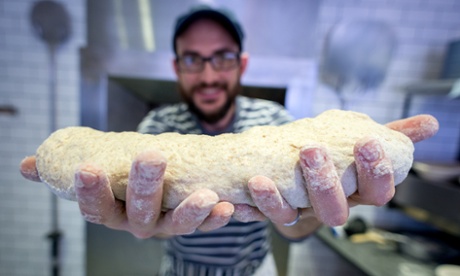
Most people take their daily bread for granted, but not 37-year-old Simon Cobb. Learning to bake hasn’t just given him a new skill – it also helped him cope with depression. “Five years ago I was a primary schoolteacher, but eventually the job got to me,” he says. “I was working all the time and still nothing ever seemed to get finished. I was signed off with stress and eventually made the decision not to go back to work.”
When casting around for something to help him get back on his feet, Simon came across a local bread-making course taught by Lewes community chef Robin van Creveld. By that point, even leaving the house had become a big thing for him, he says, but “the baking course helped with that. Just speaking to people I hadn’t met before felt like an achievement.”
The simple process of baking is increasingly linked with wellbeing. As Mary Berry once said: “If you’re feeling a little bit down, a little bit of kneading helps.” Novelist Marian Keyes also found that baking helped her cope with depression. “Baking hasn’t cured me. But it gets me through,” she wrote in her book, Saved by Cake.
Simon agrees. “Baking is therapeutic. There are necessary times of stillness and calm where there’s nothing you can do but wait for your bread to get to the next stage.” He was convinced his experience could help others and started the Stoneham Bakehouse in Hove, a not-for-profit enterprise that provides “bread by the community for the good of the community”.
It’s part of the UK’s growing community-led baking movement: a grassroots attempt to resurrect baking traditions, bring people together over food and encourage them to reconnect with the taste of real bread. The idea behind Stoneham Bakehouse is simple. Every week a revolving pool of volunteer bakers meet up to learn breadmaking skills. The loaves they make are then sold to local people at fair prices, on site or through a cafe down the road. Any profit gets ploughed back into the project so that more people can get involved.
“People enjoy the mindful aspect of baking, they enjoy the social aspect of it and learning a new skill,” explains Simon. “But it’s more than that. You’re basically giving your time for free to do something for the community.”
The bakers meet most Saturday mornings at 7.30am, and today I join five fellow volunteers in a pizza joint’s kitchen - Cobb is using borrowed ovens until he opens a bakery of his own. I’ve never made bread before, but after seeing one too many £3.99 artisan loaves around town I’m determined to see if I can do it myself.
We’re making different kinds of loaves: from humble malthouse loaf to the posher-sounding pain de campagne. To start with, I’m on rye bread alongside regular volunteer Francesca Swatton, a graphic designer.
Fran is a dab hand at making the rye dough. I step back as she portions the cement-like mixture into brick-sized slabs and soon I’m putting it in tins and sprinkling a seed mixture on top.
Simon comes over and judges the tins ready for the oven. He flours them up and expertly flips them around in the waiting flames. The timer goes on and aprons come off: time for tea.
After a quick chat and some chocolate biscuits, the morning takes on a natural rhythm. There’s a busy period as everyone gets to work on the next batch, then a period of contemplation when the bread goes in the oven and we watch it turn from lumpy dough to proper loaves.
Around 11am customers start turning up at the door for their bread. What is so rewarding is being able to see something through from scratch – kneading, shaping and baking, then selling the final product, all within one session. I leave with the other volunteers at midday, with a baby rye loaf that I made under my arm. “In the past everywhere used to have a local bakery, but now baking is a bit of a dark art,” says Simon. “It’s time to bring those skills back.”

